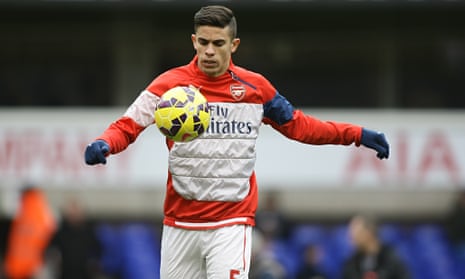For Gabriel Paulista, the pressure stands to be intense. Never mind the size of the fee that took him from Villarreal to Arsenal last month, the Brazilian centre-half has been held up as the solution to one of the London club’s biggest problems – the lack of adequate defensive cover.
There was general relief when he completed his £11.3m transfer, not least from the existing central defenders, Per Mertesacker and Laurent Koscielny. The former has shouldered the heaviest of workloads this season while the latter has had to manage the discomfort of a nagging achilles problem. Arsenal have been stretched too thinly at the back when injuries have bitten but Gabriel offers strength and reassurance.
The 24-year-old is now set to make his debut in Sunday’s FA Cup tie at the Emirates Stadium against Middlesbrough, the in-form Championship leaders and the conquerors of Manchester City in the last round. Aitor Karanka’s team had previously been close to the scalp of Liverpool in the Capital One Cup only to lose an epic penalty shootout 14-13 last September.
Arsène Wenger said that he wanted to rest Mertesacker but he added that Koscielny had a slight shoulder problem, which would need a late test. Either way, Gabriel should start and even Wenger admitted that the sense of anticipation was underpinned by tension.
“The players are always under tremendous pressure because everything they do is analysed by the pundits and the press,” the Arsenal manager said. “They know that, and the modern player has to live with that. Resistance to stress has to be stronger than it was 10 years ago. But at least he will not read the press.”
The last comment was delivered with a smile, and it referred to Gabriel’s lack of English. He has only the basics in Spanish, according to Wenger, having been at Villarreal for just 18 months and hardly anybody at Arsenal speaks Portuguese.
Gabriel’s linguistic shortcomings are part blessing, part curse. “When I was in Japan [as manager of Nagoya Grampus Eight], people could say what they wanted,” Wenger said. “I learned to speak Japanese in the end but the difference is that you can speak it and still not read the alphabet.
“The kanji has 2,000 different characters and the children at school have writing lessons every day until they are 14. And even then, they cannot read the newspaper – it takes so much time. In Japan, I only read the Japan Times – because it was in English. Gabriel will just focus on his game. That is one of the advantages.”
The disadvantages are the scope for costly communication breakdowns. “Look, it is a problem,” Wenger said. “When you don’t speak English and you don’t understand: ‘Come out, come back, right, left,’ it is a problem for a defender. You need to know the key words: ‘Referee. Offside. Foul’.
“He’s the first defender I’ve brought in with no English. In terms of other players, José Reyes was not fantastic with his English, even when he left. But Thierry Henry arrived here and three months later, he was fluent in English. Some learn quickly. For some people, it takes longer. Gabriel is very focused. We’ll see.”
Wenger will make changes to his lineup for the visit of Middlesbrough, who have lost only once since 21 October, with the one swap he confirmed being Wojciech Szczesny for David Ospina in goal. But Wenger remains determined to mount a successful defence of the trophy that he and his team won last May.
“We have always taken the Cup seriously,” Wenger said. “We have won it five times during my period here – nobody has won it more in the last 18 years. Our basic [aim for the season] is always to finish in the top four and then win a trophy on top of that.”
